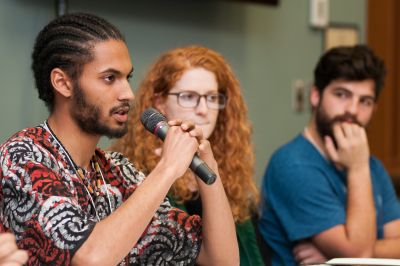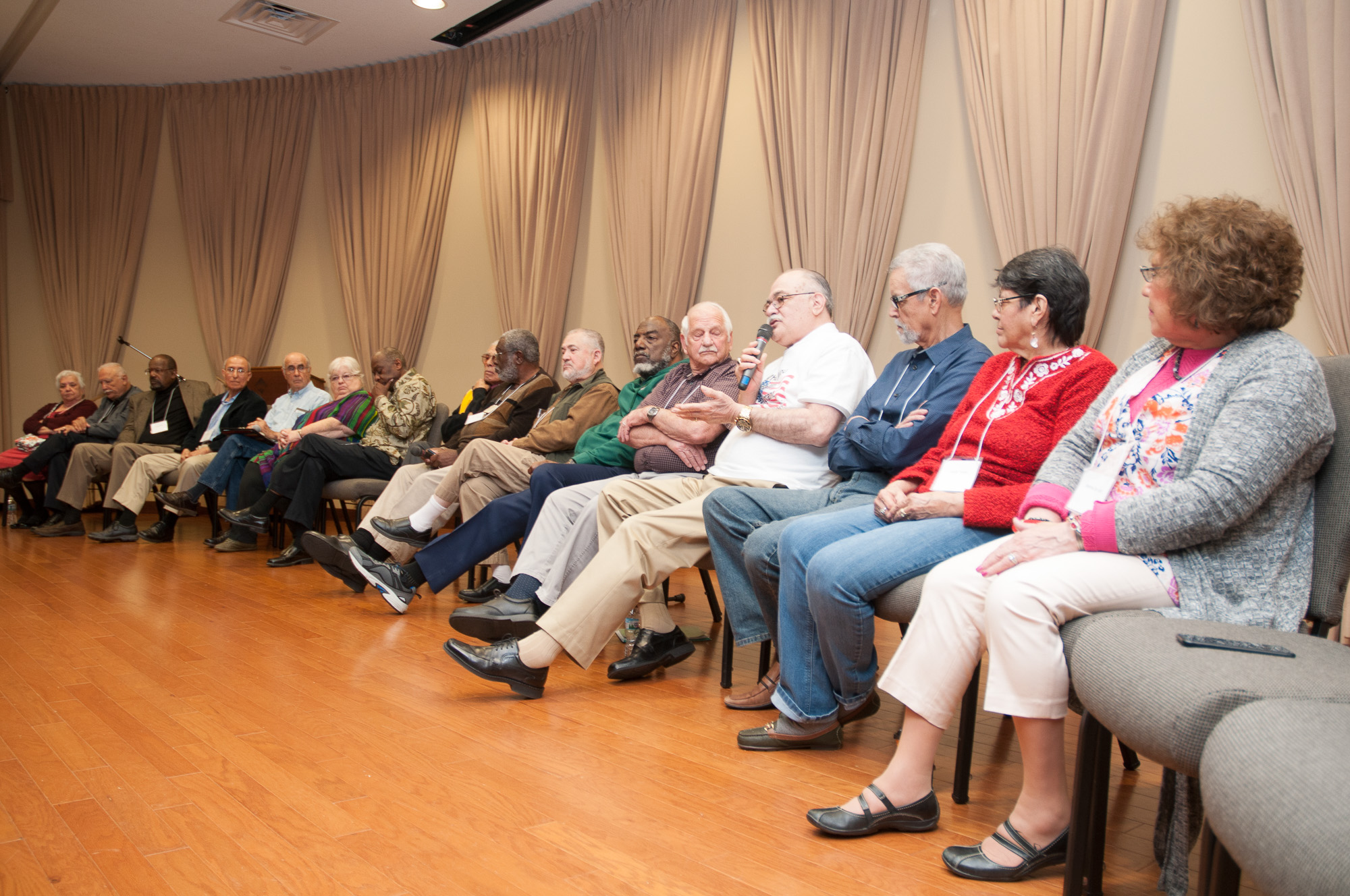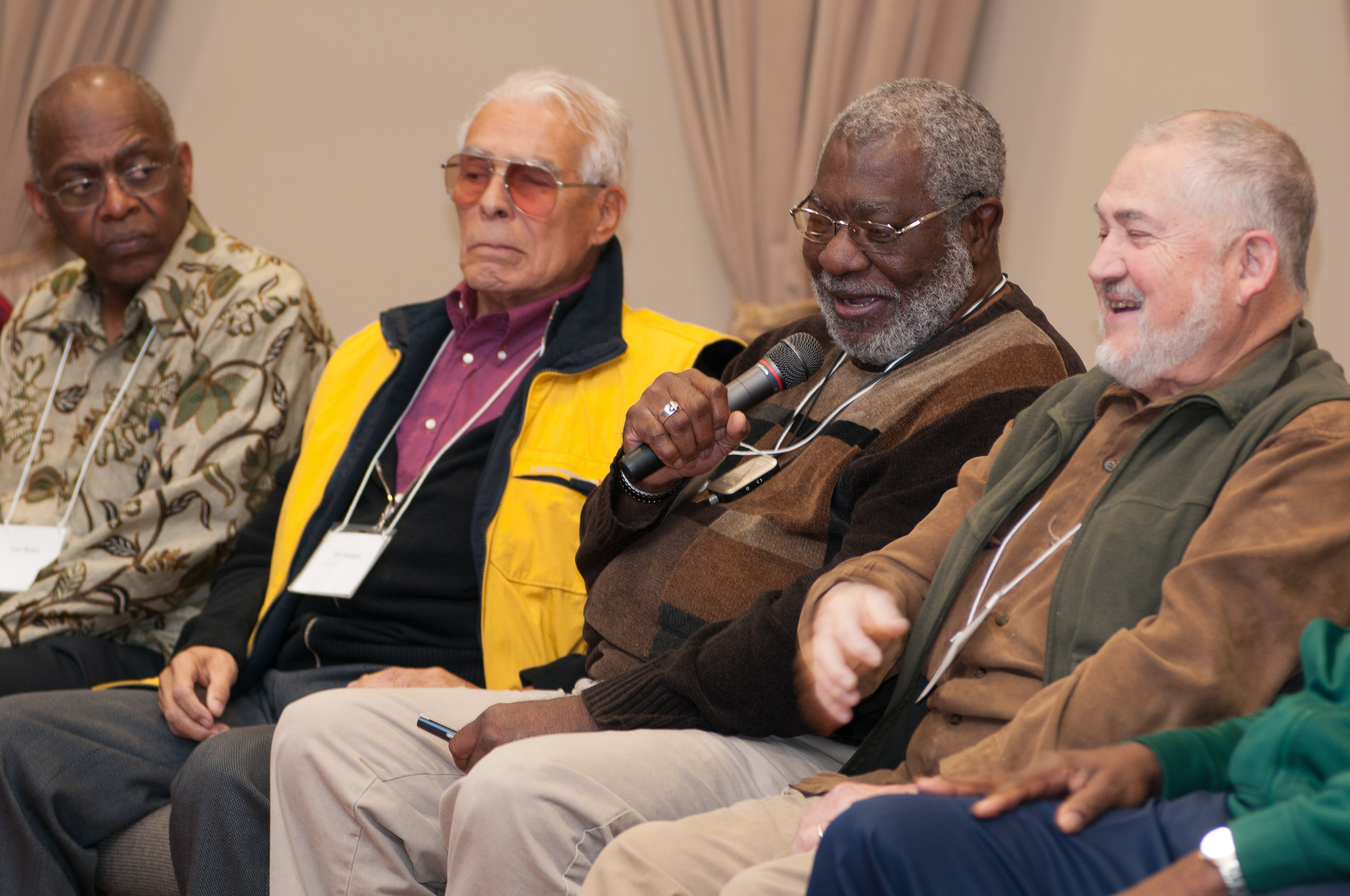History students record stories of Minority Ministry Council
By Joshua Stoltzfus

The Minority Ministries Council (MMC) reconvened many years after the dissolution of the Council in 1973 for a conference, titled: “Black, Brown, and Mennonite: Lessons from the Chicano, Puerto Rican, and Black Freedom Movements for the Mennonite Church,” from March 29–April 1 at the Greencroft Community Center in Goshen.
When former members of the council arrived, they took part in oral history interviews, which organizers of the conference and Goshen College history students recorded to be transcribed and held in the Mennonite Church USA Archives for future access.
The students responsible for the interviewing were a collection of five history students under Philipp Gollner, assistant professor of history at Goshen College and Mennonite Quarterly Review book editor. The students participated in prep sessions in oral history interviewing, listening and developing them into a finished product that can be archived and used by future academics. One such workshop was led by Tobin Miller Shearer, associate professor of history and African-American studies director at the University of Montana who spoke at the conference.
“We were thrilled to collect and record these stories, pass on some legacy of the MMC and make sure future researchers have access to the wide and interethnic stories of these trailblazers during that part of Mennonite life in North America,” said Gollner. “In particular, we’re excited to see our students and other researchers connecting the dots between these stories, and what Goshen College is becoming.”
Each interview took a total of two hours, along with a group sessions with the former MMC members all together.
Malcolm Stovall, a senior history major from Seattle, Washington, said he learned much from the interviews, both as a student and as someone entering the workforce. “I had the blessing of interviewing Lee Roy Berry, a well-respected lawyer in Goshen, and three women; Gracie Torres, Esther Hinojosa and Helen Brown, who were not officially part of the MMC leadership, as the leadership was all male, but sacrificed a lot for their husbands to even be able to do their transformative work.”

The MMC was a coalition of African American, Latino and Native American members of the Mennonite faith who came together in 1969 to address issues of race that were prominent in the United States and permeated the Mennonite Church. John Powell, one of the forerunners of the council was at that time the leader of the Urban Racial Coalition, which was primarily African-American group.
Powell, along with John Ventura and Lupe de León, leaders in the Latino community, decided that rather than separately combating this issue of minority representation throughout the Church, combining their efforts would lead to more effective action.
After four years of work, the Council was eventually disbanded in 1973. Over the weekend, the members were part of a panel discussion in which they spoke on the work of the council and the somewhat controversial disbanding of it.
The members expressed belief that the church failed to support the initiatives put forth by MCC, and many within the denomination felt uncomfortable with the radical changes that were pushed by the Council, like leadership positions for people of color. Competing ideas from within the Council hindered progress as well.
“These stories are an invitation to dig into the roots of Mennonite diversity and take up history not as a burden but as something that is inspiring us forward, messes and all,” said Gollner.
While the conference was a way to gather together once again and reflect on the past, the theme for the weekend was lessons to take away from those events. Many academics with work that integrate both religion and race were present to speak on their work as well as the work of the MMC.
Miller Shearer, along with Regina Shands Stoltzfus, assistant professor of peace, justice and conflict studies at Goshen College, and Felipe Hinojosa, associate professor of history at Texas A&M University and organizer of the conference, all gave short presentations on their work during a panel discussion, where questions were asked to understand the context of the work of the MMC in today’s society.
“The legacy of the MMC is important,” said Stovall, “because it shows us the limits of the engagement of Mennonite missions and white leadership when it came to dealing with issues of race and power, particularly issues brought up in minority communities within the mission context.”

A panel of students took the stage over the weekend as well, many of them the same students who conducted the interviews. The students who spoke identified themselves as activists on campus, leading different clubs and protests, such as Black Lives Matter marches.
“It’s this issue around power that we’re still struggling with,” said Powell. “The question is, how do we get the system to listen rather than sitting around a table like this and nodding and agreeing?”
On the panel were students who were representatives of on-campus clubs, such as Black Student Union, Latino Student Union, Prevention Intervention Network and International Student Club. Students discussed issues such as lack of intersectionality between clubs, specifically in how they compete for the same funding, the hegemony of white Mennonites on campus and addressing questions concerning sex, especially in the context of Mennonite culture.
“The stories of our elders are so important for understanding our current problems,” said Laura Miller, a senior history major from Akron, Pennsylvania. “Our problems may not all be exactly the same, but we all want the same thing–a voice in the system, decision-making power, and justice/equality.”
The former council members also greatly appreciated the interviewing process. “It felt really good passing on the stories,” Powell said about the interviews. “The students were inspired and engaged. We were passing the mantle I guess, just in a different place. It’s a mentoring situation.”
“Activism and spirituality are not mutually exclusive,” said Gollner. “Our generation, and the students’ generation was invited to take over the baton from MMC leaders and draw from the deep spiritual resources of a faith community to transform the present, even when – and especially when – that faith community is flawed and has failed you.”




